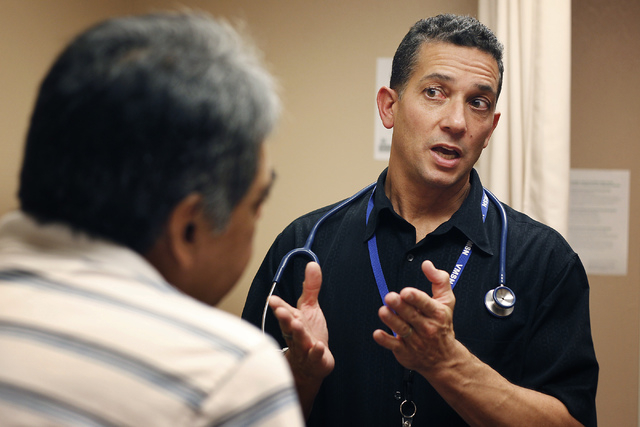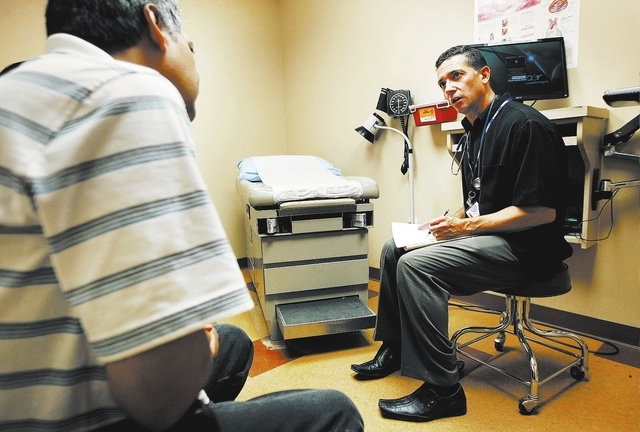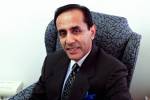Nevadan at Work: Family doctor disavows insurance, turns to concierage medicine
Dr. William Pierce needed to try something new.
As a family doctor, Pierce grew tired of today’s standard care model, with its insurance-based billing practices and its big patient counts.
So six years ago, Pierce turned to concierge medicine. He no longer accepts insurance, instead billing patients directly for an annual membership that comes with routine office visits, phone consultations and on-site fills of prescriptions for antibiotics and cough medicines.
Patients even have after-hours access to Pierce via cellphone or email.
Pierce says ditching insurance lets him be the doctor he trained to be, playing a more active role in his patients’ cases: He has just 250 patients, about a tenth of the load of a traditional family practice.
Plus, freeing himself from the tangled insurance web has given Pierce time to treat patients for free at the Volunteers in Medicine of Southern Nevada Clinic at 4770 Harrison Drive. The group, which held its fifth annual charity ball at The Venetian on Saturday night, provides free medical care for the working uninsured or the unemployed.
Question: Why did you choose medicine?
Answer: It’s the stereotypical answer. It was an idealistic thing. When I was eight years old, I thought it was what I wanted to do. The career brochure looked good. In college, I got to look seriously at whether I really wanted to be a doctor, doing the rotations and seeing the lifestyle. I originally wanted to go into microvascular surgery, but I didn’t want to spend every day in the hospital. I considered emergency medicine for the variety, but I changed to family practice. I like to be my own boss, so I wanted my own practice. And I like the fact that people trust me to solve their problems at a personal level.
Question: Why did you switch to a concierge model?
Answer: For the relationship between patient and doctor. It’s what we all trained for, but no one gets to do it because of insurance. You’re catering to third parties, and their primary interest isn’t patient health, it’s profits. So you might have to make decisions for their benefit, not the patient’s. It’s a real conflict for doctors.
I got tired of working with insurance. The reimbursements were getting worse, and I knew I had to do something different. I could move, or sell vitamins and Botox, or go to a quick-care model where you spend three to five minutes with each patient. None of those appealed to me. The concierge model, with the smaller patient base, made more sense. I could get more involved with patients, which is what I was trained to do.
Question: What do you enjoy most about your work?
Answer: The relationship with my patients. Having a practice of less than 500 patients lets me get to know patients more intimately. I can do more. If a patient calls at 2 a.m., I’m in a much better position to respond than if I’m covering for colleagues and I’m guessing at how to respond.
Question: What’s the downside?
Answer: One of the things I didn’t really think about is how the volume of patients in a traditional practice helps keeps you up on experience. I go to medical conferences for continuing education, but let’s say you’re putting in stitches. In a smaller practice, you need to do that once to a few times a week, or a few times a month. In a higher-volume practice, you might do it more frequently. Or take eye care. If someone gets something in their eye, like a shred of metal, they usually go to the ER or urgent care. We may not see that kind of case very often.
Question: You also give your time to Volunteers in Medicine of Southern Nevada. How did that start?
Answer: My belief is that when doctors are well-compensated for their care, they can do things they used to do a long time ago. We would offer care to the indigent. We would offer care to the community. When you’re scrutinizing nickels and dimes, some of that additional community care dries up. A lot of doctors don’t have the time, they’re so busy seeing patients and getting paid a fraction of what they’re used to. The altruistic side doesn’t always come out.
I created this practice. I can’t look at myself in the mirror and say, “You’re not as pressed for time. Why are you not doing what medicine does when it has the opportunity to help?”
I talk to colleagues who wish they could do it, but they just don’t have the time.
Question: Any special experiences that have stuck with you?
Answer: With the volunteer clinic, it’s the gratitude of the patients. They’re great human beings who honestly appreciate the care we’re providing. It’s an enjoyable environment to work in. I don’t have to punch a clock or have a certain number of patients, so it mirrors my clinic in that I can have a relationship with the patients and spend time with them. And I don’t have overhead to worry about.
Question: What would you say has been your biggest career accomplishment?
Answer: My concierge practice, because there was no model. There was no book laid out for this. Clearly, there are problems in health care, and I’ve tried to do something about it on the national and state levels (as a member of the American Academy of Family Physicians). But it became clear I wasn’t going to get anywhere with a single voice. If I can’t make change on a bigger scale for my colleagues, what can I do for my patients, my family and myself? So creating this practice is my greatest accomplishment.
Question: What’s ahead for you career-wise?
Answer: I would be content for the remainder of my career to simply grow this practice, and grow my relationships with the patients I have and the new ones I get. I feel like I get to be the doctor in the brochure I read when I was eight years old.
Question: How will Obamacare affect your practice?
Answer: A lot of people are scared. People want to know what they need to do. A lot of people have questions about the individual mandate, so I do a lot of educating. And a lot of people have employer-based insurance, but there are so many obstacles to care that they use me to help them navigate the system. We’re all trying to interpret this.
Question: Will the law hurt your practice?
Answer: I don’t see it that way. What I prefer is that patients do something like catastrophic insurance anyway. In the scheme of health care, I’m relatively inexpensive. It’s hospitalizations and surgeries that can bankrupt people. There are some changes in health-savings account contributions that could affect the practice. We just have to educate patients and let them know the law doesn’t mean they can’t use a concierge practice.
Contact reporter Jennifer Robison at jrobison@reviewjournal.com. Follow @J_Robison1 on Twitter.





























